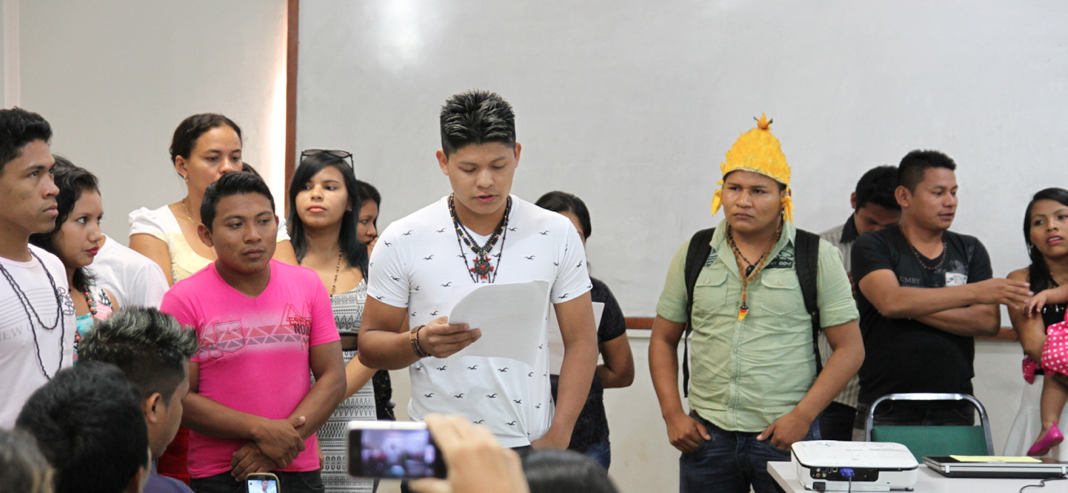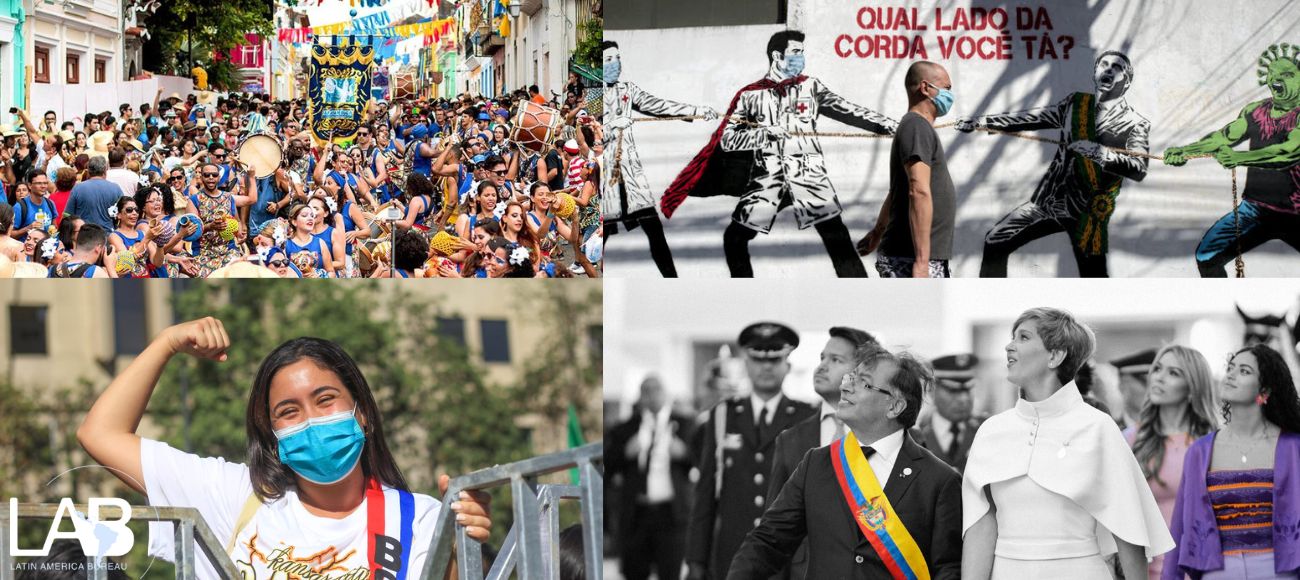On 11 May around 15 Munduruku students at UFOPA (Federal University of West Pará) carried out an act of protest against the research being developed by a Brazilian social anthropologist, Daniel Belik. The action was undertaken after the researcher, a postgraduate student at the University of St Andrews in Scotland, made a presentation entitled: “Who are the many Munduruku?”
According to the Munduruku, Belik has been expelled four times from different Munduruku villages due to the way he has behaved on their territory. The most recent of those incidents took place at their most recent Assembly, after an executive decision on April 5, reported by Amazon Watch. They have rejected him, they claim, because he did not clearly expressing his academic intentions, he introduced himself as being connected to a different organization on each occasion, and for claiming, falsely, to be part of an educational project called Ibaorebu, when it was carrying out one of its courses at Sai-Cinza village, near the town of Jacareacanga.
During the act, the Munduruku students said a few words in which they repudiated Belik’s methodology, called for his research to be ended, and read out a letter signed jointly by the Munduruku movement ‘Ipereğ’ayũ’, two Munduruku associations (Pahyhyp and Pusuru, from Middle and Upper Tapajós river) and the indigenous students themselves.
The original letter (in Portuguese) was published on the day on the Movimento Xingu Vivo website, and divulged by social media and Brazilian bloggers. It was also sent by the Munduruku movement ‘Ipereğ’ayũ” to Dr Mark Harris, Daniel Belik’s supervisor at University of St Andrews.
The Munduruku leaders asked LAB to translate the letter and to publish it on its website. It can be read below. On 18 May the Brazilian blog ‘Combate Racismo Ambiental’ published a letter to the Munduruku People written by Daniel Belik in response to the Indians’ action. The letter can be read here (in Portuguese).
Images by Carlos Bandeira Junior
On 18 May the Brazilian blog ‘Combate Racismo Ambiental’ published a letter to the Munduruku People written by Daniel Belik in response to the Indians’ action. The letter can be read here (in Portuguese).
Images by Carlos Bandeira Junior
Pará state of Brazil, May 11, 2015.
“Who are the many Daniel Belik?”
During the intensive period of the Ibaorebu (Munduruku technical workshops) in December 2013, the anthropologist Daniel Belik first appeared at Sai-Cinza village, near the town of Jacareacanga in the state of Pará. At the time, he was working at FUNAI (the Brazilian government’s Indian Agency) and he arrived with a group of technical consultants. He was not part of the Ibaorebu project. Daniel Belik did not explain why he was taking part in the project, what was the purpose of his visit to the village, nor what type of work or research he intended to undertake. While he was there, Belik observed the students and made a series of notes on the comments they made in the classroom. The students started to feel unconformable and suspicious, and started to question him, telling him clearly that he was not authorized to take photos or to write notes.
In 2014, at Caroçal village along the Das Tropas river, Belik visited once more the classes in the Ibaorebu project, but this time introduced himself as a teacher who formed part of the project. The students and those living at Caroçal village were immediately suspicious, since everybody knew that Daniel Belik had never formed part of the teachers’ team in the Ibaorebu project.
During an assembly organized by the ‘Munduruku Movement Ipẽrẽg’ayũ” at Cururu river, in April 2014, Belik arrived with the FUNAI group, saying he was working for them. Again we felt suspicious.
We have never found out, in fact, who Daniel Belik is. Is he a teacher? Is he a researcher? Is he a FUNAI worker? For this reason, we Munduruku are not willing to work with him nor to allow him to continue with his work. Whatever that work may be.
In November 2014 at an Ibaorebu course, in Sai-Cinza village, Daniel Belik, together with Pierre, another researcher from France, appeared once more without an invitation and was not made welcome. The students on the Ibaorebu project told Belik that he did not have permission to be present and he was forced to leave immediately. In the turmoil, he tried to negotiate, but the students and other members from the community were very impatient and expelled him again.
At the beginning of 2015, Belik visited the Katõ village, at Cabitutu river, where he was expelled by the residents in the village. He tried to negotiate with people living in the village, saying he was interested in researching the Munduruku people, but they said they did not want researchers in the village. Subsequently, they asked him to leave.
From what we have heard from our fellow Munduruku, based in our villages, Belik has been saying that he obtained authorization from FUNAI’s Regional Coordination to enter the indigenous area. However, we say that we, the Munduruku people, are the guardians of our territory. Respect is what we expect, and anyone wanting permission to carry out serious and ethical research on us must ask us for permission.
At last, at the most recent Munduruku people’s assembly (March 31–April 6, 2015) in Waroapompu village, the anthropologist finally tried to explain to us what he was attempting to do in our villages, but the Munduruku immediately rejected his proposal and, once again, expelled him, saying that we, the Munduruku people, do not want any researchers in our territory.
The Munduruku have already established that no-one called a “researcher” has authorization to enter the Munduruku territory. We are apprehensive because of the Federal Government’s plans to build the Tapajós Complex [of hydroelectric dams]. We know that large engineering companies have a huge interest in this project. During this tense period, we are very cautious of all people who arrive in Munduruku areas.
Any information collected about our people must not become data that might be of interest to the dam developers or simply be part of anyone’s academic career. Anyone who uses use our name, our history or our culture improperly will have to respond for their acts and will have to be responsible for their actions.
People competent to do so must take action with respect to this issue. Universities must not support research undertaken without the authorization of the Munduruku people. It is our life, our culture, it is our existence as people that is at stake, and we are going to struggle for all these in all spaces, including academia.
We are at war, and “the fight to defend our Rights and Territory” is not just with the bow and arrow. The moment is propitious for war, and if we obtain heads, which are the most valuable trophies, we will gain magical powers for combat. We know that the battle may be bloody. If we lose fighting, we are still going to be proud, and what happens to us will become part of our history. Our bravery defending nature and the diverse forms of life in Earth will continuously be retold to future generations.
If we do not achieve what we want with this letter, then it will be war! It will be our last resort.
Saweee!!!
MUNDURUKU MOVEMENT IPEREĞ’AYŨ
INDIGENOUS ASSOCIATION PUSURU
INDIGENOUS ASSOCIATION PAHYHY’P
INDIGENOUS STUDENTS MUNDURUKU


